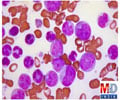A new experimental drug could be successful in killing only the malignant B lymphocytes, which cause chronic lymphocytic leukemia (CLL).

When CLL treatment destroys T lymphocytes along with the cancerous B lymphocytes, patients become highly susceptible to life-threatening infections.
A new study by researchers at the Ohio State University Comprehensive Cancer Center — Arthur G. James Cancer Hospital and Richard J. Solove Research Institute (OSUCCC — James shows that the experimental agent PCI-32765 selectively kills the cancerous cells alone. The findings have been published online in the journal Blood.
“A drug that kills malignant B lymphocytes and spares T lymphocytes could dramatically improve outcomes for CLL patients,” says study leader Dr. John C. Byrd, director, division of hematology and professor of medicine, of medicinal chemistry and of veterinary biosciences at the OSUCCC — James.
“Our collective results indicate that PCI-32765 is an outstanding candidate for further development as a therapeutic for CLL,” says study co-director Dr. Amy J. Johnson, assistant professor of hematology and medicinal chemistry, and a CLL researcher with the OSUCCC-James.
The research by Byrd, Johnson and a group of colleagues used CLL cells from ten patients. It had several key findings related to PCI-32765:
Advertisement
The agent inhibits the proliferation of CLL cells in laboratory culture and promotes their death by self-destruction (apoptosis).
Advertisement
Source-Medindia












